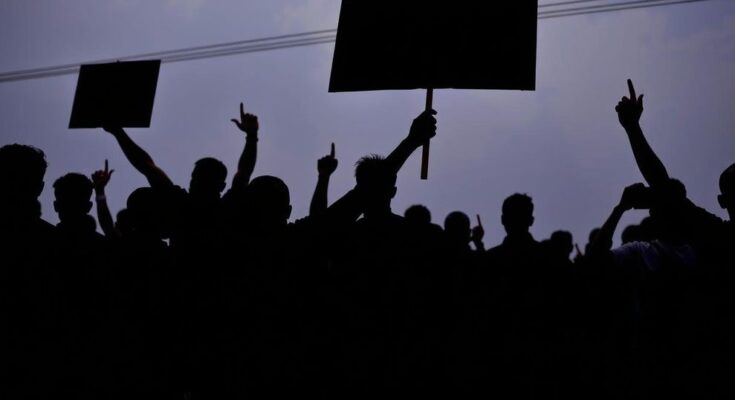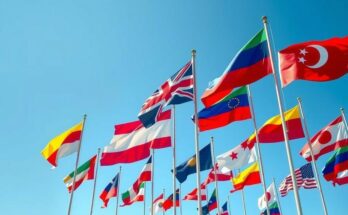Hundreds of protesters in Kinshasa demand the release of political prisoners, including three prominent opposition leaders. The movement criticizes President Felix Tshisekedi for politically motivated incarcerations and emphasizes the necessity for reform within the Congolese political system amidst a backdrop of overcrowded prisons and a contested political landscape.
In Kinshasa, Democratic Republic of the Congo, extensive protests unfolded on September 25, 2024, demanding the liberation of political prisoners, specifically three leading opposition figures. Hundreds of demonstrators rallied outside the highest court in the nation, calling for the release of these detained individuals, whom the opposition asserts are incarcerated on baseless political charges. President Felix Tshisekedi, who was reelected in December under contentious circumstances, has faced repeated accusations of attempting to undermine dissent and curb political opposition. During the protest, attendees held signs proclaiming “Release political prisoners,” while some voiced their frustrations by chanting, “Tshisekedi, you have killed our country!” Protesters also obstructed access to the courthouse, emphasizing the urgency of their demands. Representatives from multiple opposition parties subsequently submitted a formal appeal to the Minister of Justice, accusing President Tshisekedi of suppressing political dissent. Fiston Mayas, a member of the Together for the Republic party, articulated, “We came to see the minister of justice to tell him that it is not normal that in a state governed by the rule of law, there are political prisoners who are imprisoned unjustly.” The opposition’s plea specifically included the release of Jean-Marc Kabund, Mike Mukebayi, and Seth Kikuni. Kabund and Mukebayi have been imprisoned since last year on charges related to insulting the president and disseminating false information, with Kabund receiving a seven-year sentence for alleging government corruption. Both are currently detained in Makala Central Prison, notorious for its extreme overcrowding and harsh conditions. In a recent incident, an attempted escape from this facility resulted in the loss of 129 lives, underlining the dire state of the prison system in Congo. Additionally, Kukuni was apprehended this month on charges of inciting civil disobedience and awaits further developments. Meanwhile, Congo’s intent to pursue a position on the United Nations Human Rights Council has drawn substantial criticism from opposition figures and human rights advocates, indicating that the nation’s governance and human rights practices do not align with the responsibilities expected of such a seat. Critics argue that the UN Human Rights Council has been compromised by nations with poor human rights records seeking protection from scrutiny, further complicating Congo’s aspirations on this international stage.
The Democratic Republic of the Congo has faced considerable political turmoil, with multiple instances of contested elections and allegations of human rights abuses. President Felix Tshisekedi’s tenure has been marked by accusations from opposition parties of authoritarianism and suppression of dissent. The current protests represent a broader movement among citizens and activists seeking to highlight the plight of political prisoners and call for significant reforms within the Congolese political system. The Makala Central Prison, in which prominent political dissidents are held, has gained notoriety for its deplorable conditions and overcrowding, which has increasingly drawn the attention of international human rights advocates. Furthermore, recent events surrounding Congo’s application for a UN Human Rights Council seat emphasize the disparity between the government’s image and its actual human rights practices, stirring further public outrage. As the nation grapples with ongoing challenges, the international community remains observant regarding the developments concerning political prisoners and the broader implications for democracy and governance in the Democratic Republic of the Congo.
The protests in Kinshasa reflect growing dissent against President Felix Tshisekedi’s administration, notably regarding its treatment of political opponents and prisoners. With significant numbers demanding the liberation of political prisoners, the situation illustrates the tension between governance and human rights in the Democratic Republic of the Congo. The calls for justice and reform could potentially reshape the political landscape in a nation with a history of political unrest. Continuing scrutiny from both national and international entities will be essential in addressing these injustices as the Congolese populace demands accountability and change.
Original Source: apnews.com




